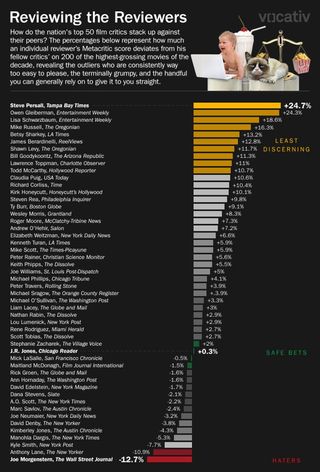New Study Asks Which Movie Critics Are Still Effective

If you had to name the most trusted critics in America, Roger Ebert would have been pretty high up on the list, if not on the top. He didn’t seem like too much of a snob, yet he wasn’t a complete studio shill, which made him seem like the people’s critic. Later in his life though, he admitted (while his reputation was still very much intact) that he might have been a little less discerning than everyone made him out to be. As it turns out, Voactiv did some number crunching with his reviews, and found that he was 18% more approving of films than any other critic. Which begs us to ask the question, who can we trust when it comes to telling us what movies are good and which are crap?

Above you’ll see Voactiv's handy infographic (which can be seen in higher resolution at the source link included) ranking a sampling of 50 critics that have reviewed at least 40 of the 200 highest grossing movies in the last decade. The factors that the site took into account included among them the sphere of influence each critic had, their reputation, the frequency of their reviews, and their their average Metacritic scores compared to the overall score of said films. Keep in mind that while this experiment is a fun exercise in analytics, it's obviously not the real way to determine the "best critic" for everyone.
The first thing you can clearly see in the data is there are more critics that are in the overzealously positive "Less Discerning" camp than on the more destructively negative "Haters" side. The positive side of the scale also enjoys some more diversity in its numerical values. It's believable that these numbers are also influenced by critics that really like to see their names on pull quotes. The critic with the most positive reviews under their belt was Steve Persall of The Tampa Bay Times, who was described by Voactiv as possessing:
"…wide-eyed hackery... best illustrated through his unchecked raves for near-universally panned bombs like Gulliver’ Travels, The Tourist and The A-Team, the latter of which he described as "literally a blast" (get it?)"
On the other side of the spectrum, there seems to be a more incremental rise in the percentage of negative reviews, except for the last three critics listed - who each enjoy a spike in the neighborhood of two percentage points each. Going by this infographic, the most discerning reviewer in the group is none other than Joe Morgenstern, a film critic over at The Wall Street Journal. A particularly damning statement that Morgenstern made to put himself on this list was his from his evaluation of Kill Bill, as he believed that Quentin Tarantino's movie inflicted:
"intolerable cruelty on its characters, and on its audience."
Smack dab in the middle of the chart are the most reliable critics, or as they like to call them "The Safe Bets." Out of 50 critics, only four could be considered safely in the center between loving and hating everything they happen to watch. The most trustworthy in their ranks was none other than J.R. Jones of The Chicago Reader. His numbers matched closely to that of MetaCritic's ratings for most of the films sampled, and:
"If you put all 50 of our critics in a room, he’s the one they’d agree with most—and probably the one you could trust most to size up a movie, if you had to pick just one."
So why is Roger Ebert, the fourth ranked critic on the Less Discerning list, still considered a top critic even after his death? His appreciation for film, as well as his knowledge of its history made him a well respected critic that the movie-going public, by and large, felt was the most trustworthy. He might not have been the most discerning in a cold, numerical fashion, but if you read his reviews you’d see that he could at least back his opinions with solid thinking.
If you're going to evaluate a critic, it's advised that you read a healthy sampling of their reviews, and don't judge a review by its rating. Again, there is no clear critic who is the best at what they do, because the wide reaching tastes of the movie going public cannot be boiled down to one definitive personality. A critic's skill should be measured like the movies they critique: on a case by case basis, and in tune with the personal tastes of the audience member in question. Which brings it all back around to the question we set forth to answer in the beginning: can we trust movie critics to be the sentinels of taste, or are they either less discerning shills or hateful hacks? Answer: it depends on who you ask, and whether they own a copy of Gigli or not. Depending on your reaction to the answer, you’ll know which direction to head off in.
CINEMABLEND NEWSLETTER
Your Daily Blend of Entertainment News

Mike Reyes is the Senior Movie Contributor at CinemaBlend, though that title’s more of a guideline really. Passionate about entertainment since grade school, the movies have always held a special place in his life, which explains his current occupation. Mike graduated from Drew University with a Bachelor’s Degree in Political Science, but swore off of running for public office a long time ago. Mike's expertise ranges from James Bond to everything Alita, making for a brilliantly eclectic resume. He fights for the user.
Most Popular




